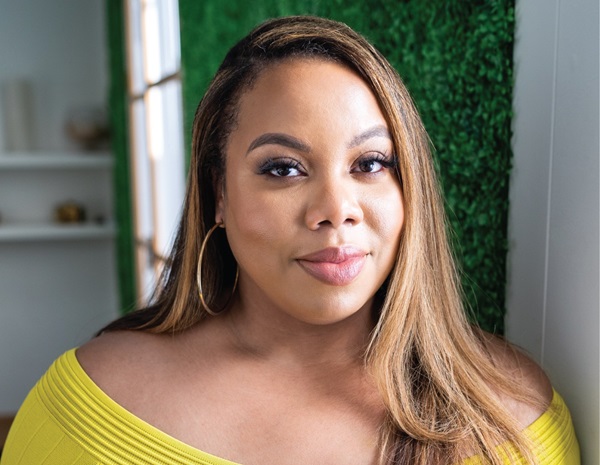Our industry has committed itself to making our workplaces trusting places to have complex, and sometimes difficult, conversations about diversity and inclusion.
PhRMA’s Courtney Christian, Senior Director of Policy and Research, had the opportunity to connect with Dr. Lauren Powell about her career, role at Takeda leading its efforts on health equity, and how we collectively have an opportunity to create initiatives that intentionally consider all communities.
Courtney Christian (CC): Tell us about the work that you do, and why you wanted to have this conversation?
At Takeda my role is to develop and execute our health equity strategy, including helping to address the root causes of inequities – like racism – and working to implement sustainable changes that promote health equity. I’m the first in this role for Takeda, and it is an incredible opportunity to help lead biopharma in recognizing this industry’s role in promoting health equity and shaping community wellness.
I wanted to have this conversation because I think it’s important to shed some light on what embracing health equity means beyond simply a definition, but what it means to apply a health equity lens in day-to-day decision making in pharma.
CC: How have things changed for Black and Brown people in the industry over the years? What’s still the same? Does this year feel different than past years?
While I’m relatively new to the pharmaceutical industry, my work across the health care ecosystem and in public health as well as my own experiences has provided me with a few perspectives on how things have and have not changed over the years. Unfortunately we are still seeing that racism and underrepresentation does still exist in the workplace, and pharma is not immune on this. For patients, there is also a long history of understandable medical mistrust by Black, Indigenous and other diverse communities of color due to a history of racism and medical exploitation and we continue to see a great need to rebuild trust in these communities.
However, I do think that we are on a journey towards fully embracing anti-racism and equity. We’re starting to see progress in some areas such as more diversity in the workplace, but the industry has more work to do there particularly in representation across the C-suite and Board of Directors. But take for instance my role, which is the first role of its kind for Takeda. I, along with my other Black colleagues in leadership roles, am representative of the evolution we’re starting to see unfold and I think this symbolizes much needed change. I consider myself an optimist but I am also realistic in knowing that progress takes time. My hope is that the steps that we are taking today aren’t simply a flash in the pan and we will continue to see health equity and DE&I as lasting business imperatives.
CC: The pharmaceutical industry made a commitment to Racial Justice after the murder of George Floyd, and your companies have been actively working towards that effort. What do you see as having the biggest impact or what are you most impressed by?
One of the biggest impacts is recognizing the power that we as the pharmaceutical industry have in terms of giving, sharing and educating – and this goes beyond financial resources to actually investing time and effort in the communities in which we work and live. I’ve been encouraged by the industry as a whole who has been more vocal than ever before about the impacts of racism.
At Takeda we’ve been doubling down on our efforts to promote community wellness and lead with a health equity lens by building meaningful relationships with leaders across our health care ecosystem outside of pharma, and within communities across the country where we have a presence. This includes improving clinical trial representation through a community-engaged approach as well as deepening our commitment to embracing and embodying the core values of equity, diversity and inclusion in our workplace.
There’s still more work to do but we are taking strides to help create a more equitable health care system.
CC: There are likely a lot of young, Black and Brown professionals just starting out, who will read this article and look to you for guidance. What do you want them to know?
I think it’s really important for young Black and Brown professionals, and really anyone starting their career, to know that there isn’t necessarily a blueprint to follow. I traveled the path that was mine to travel and I would encourage people to follow what interests them, but know that there will be barriers too, especially for Black and Brown professionals. However, there are many examples of inspiration across industries where we’re seeing prominent positions filled by people of different backgrounds for the first time ever and that is really encouraging.
I would offer the advice to lean in to one’s own experiences and how your journey can help provide insight and perspective on your work – regardless of the field. There is no “secret sauce” that will provide a competitive edge. Being who you are and being comfortable with one’s own voice to share their important stories and lessons learned is what I see as the best way to ascend to success.
I also want to call out the importance of wellness and mental health. I’m so proud to see Millennials and Gen Z, take for instance Simone Biles and Naomi Osaka, who have taken visible action to protect their mental health and psychological safety. You don’t get bonus points for burning out and that’s something I try to remember and reiterate among my colleagues.
CC: COVID-19 has had – and continues to have – a huge impact on communities of color. What lessons should industries like ours learn from that? What ways should industry band together to work for equitable outcomes?
Roles focused on health equity are relatively new and while building internal company strategy is important I think we also need to look at the problems holistically and collaboratively as an industry to come together to drive change collectively. Through efforts around COVID-19 we have seen how much can be accomplished when we work together to address urgent needs. The longer we wait to work together, the more lives that we are putting at stake – the same goes for creating a more equitable health care system.
Alignment and commitment from organizations like PhRMA are also key, and it is helpful to have resources like the PhRMA Principles on Conduct of Clinical Trials to help guide the industry’s commitment to clinical trial diversity. The entire health care system has a role in addressing systemic racism and while inequities throughout history exist, we as an industry have an opportunity to write a new chapter. Together, we can leverage our passion for patients into action and pave the way by showing what it means to prioritize health equity and diversity as an industry.





